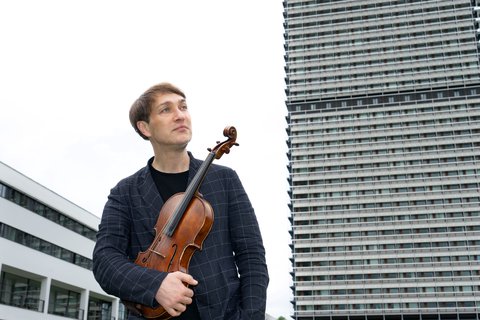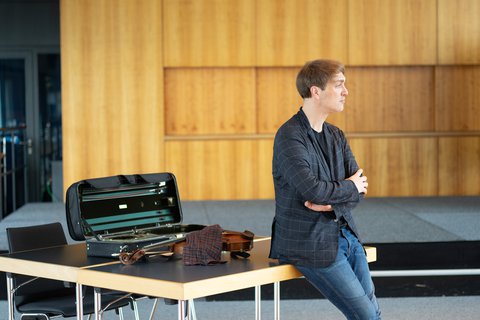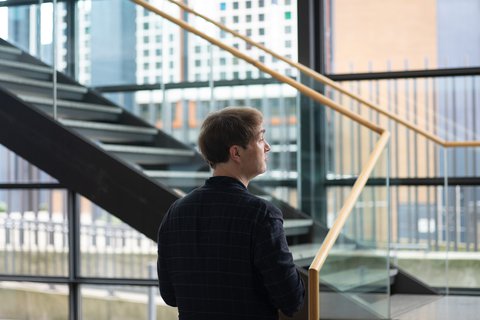Nils Mönkemeyer has long been associated with Bonn through his own festival »Klassik für alle«. At this year’s Beethovenfest, he is contributing his ideas for more participation through the Sponsorship Ticket and playing two very different concerts.
What connects you to the viola, what appeals to you about it – why did you choose this instrument?
I don’t know exactly whether you actually choose the instrument yourself or the instrument chooses you. What I say with the music is more or less how I hear music inside. That then comes out through the instrument and other people hear it. And there has to be a correspondence in between. The way I perceive music is like the sound of the viola: a bit dark and sometimes a bit dreamy. The viola is never completely direct, but actually very friendly.
How does playing the viola feel, also in comparison to the violin?
You hold and play the viola just like the violin. With the violin, at least for me, it’s like this: I have relatively long arms. When I stretch out my arm and put a viola in it, everything is in the right place. With the violin, I always didn’t know where to put my arms and my body. That’s why I always felt a bit like a giant with a miniature instrument. And then I got the viola! It’s a bit like the cello: the low notes produce a kind of vibration. When I play, I can feel it all over my body and I find that very, very beautiful. That’s why the viola was much more physical and bodily for me than the violin.
What are you most looking forward to when you think about your two concerts at the festival?
There is nothing in particular, but I am very happy to be part of Beethovenfest. I think that with this renewal that has taken place here, there are so many exciting programmes and a spirit of openness and exploration. I find that totally exciting. Of course I hope that I am part of something new happening, that something is created for the audience that perhaps wasn’t there before in this form, that people take something away with them. Democracy is also the theme this year, so togetherness – that’s what I’m looking forward to the most, because all the concerts have this aspect of togetherness and shared experience.

Am Festival-Abschlusstag wirst Du im Musikfest der Demokratie auftreten, im Bonner Regierungsviertel, an Orten, wo sonst keine Musik zu hören ist. Wie stellst Du Dir es vor, im UN-Hochhaus zu spielen? Was macht so ein Ort mit einem Konzert?
It will be interesting, because that is also a part of Bonn – this strong presence of what was once the capital. There are still a lot of government institutions here. I think that just walking through these buildings creates an awareness of the history we are part of. And also that the city has been a city of democracy since the beginning. That is something very special.
Would you say that music or culture contributes something to the democratic culture in society?
There is perhaps nothing more democratic than music. Music has this incredible advantage of starting outside of language. When I talk to people in the audience, for example, there are bound to be things that separate us. With music, you just brush that aside and it doesn’t matter at all. That’s why I think the concert hall is democratic in the deepest sense. I think it’s a beautiful symbol that the Democracy Music Festival brings music to all these places that are characterised by the goal of finding a consensus together.

You are committed to making music even more democratic and accessible for people where access to it is not so self-evident. What motivates you in this work?
For a while, it really annoyed me that there was a lot of larmoyance behind the scenes in the music market. Along the lines of »people aren’t coming to the concerts any more« and so on. I thought: enough of this complaining. We simply have to do something. I currently live in Munich. This city is extremely expensive. That was my first thought: the cost of going to a concert is too high for many people. That’s why I think the Pay What You Can pricing model for the concerts at the Democracy Music Festival is a great idea. As a concertgoer, you can say: I’ll pay what I can. That could be €5 or €50. In principle, this is also the idea behind the sponsorship tickets that I developed in the »Klassik für Alle« (»Classical Music for All«) project with Caritas in Bonn. Patent tickets are concert tickets for people from the Caritas clientele. Any person or company can donate tickets and the system then distributes them to those in need. At this year’s Beethovenfest, there will also be the opportunity to donate sponsorship tickets for three concerts, including my concert in Bad Honnef.
You play Baroque violin music in the Kursaal Bad Honnef. What is this programme about? Are there any challenges in transferring the violin sonatas to the viola?
In the concert in Bad Honnef, I would like to offer a platform to outsiders in music history. Opulence was very much celebrated in the Baroque era. I think that did something to people. It was a time of joie de vivre. At the same time, there were a lot of rules in music. But where there are many rules, there are also rule-breakers. Johann Sebastian Bach is perhaps the most famous example: he skilfully mastered the rules, but also broke them and created something completely new from them. The fact that I play the violin repertoire on the viola is actually a minor matter. I can do it on the viola too!

Your second project at the Democracy Music Festival is with the music initiative Musethica e. V. What does this organisation do and how did the cooperation in Bonn come about?
Musethica is active in several countries. One of its aims is to promote young talent. This means that more established seniors play together with younger musicians. This results in an intergenerational exchange in terms of learning and teaching and music-making at eye level. Chamber music creates a kind of togetherness. Another basic idea behind Musethica is that when I start playing as a young musician, I have to learn to perform on stage. Musethica offers this concert experience and combines it with going to social organisations and playing for people who might not be able to come to a concert – a wonderful win-win effect. I immediately found it very appealing to take part. And as I worked a lot with Caritas in Bonn and had this network here at my disposal, I thought: perfect, we can do something with this.